Air Pollution of Olympic Proportions
Air Date: Week of November 23, 2007
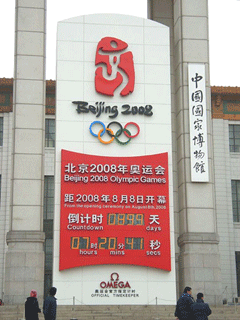
Countdown clock to the 2008 Beijing Olympic Games (Photo: Flickr/Gene Zhang)
Chinese officials promised the summer's Beijing Olympics would be the greenest ever. They've made great strides but air pollution still remains a problem. Living on Earth host Steve Curwood talks with Nick Nuttal, spokesman for the United Nations Environment Program about UNEPs recent report on the Beijing Olympics.
Transcript
CURWOOD: Chinese officials promise the Beijing Olympics and Paralympics to be held next August and September will be the greenest ever. But, the President of the International Olympic Committee says some events could be postponed when the air is unacceptable. The United Nations Environment Program recently published a report on the progress China has made to clean its environment in advance of the Olympics. UNEP spokesperson Nick Nuttal says China has come a long way….but there’s still a lot of room for improvement.
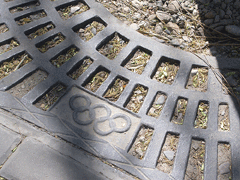
Some tourists say that everywhere you look, you see reminders that Beijing will be hosting the 2008 Summer Olympic Games. (Photo: Flickr/Oldtasty)
CURWOOD: So, what’s the most difficult problem they’ve had to tackle?
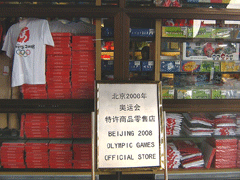
Buy early to beat the rush! Beijing stores are already selling 2008 Olympic souvenirs. (Photo: Flickr/Betta Design)
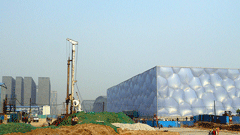
The semi-transparent National Aquatics Center is also known as 'The Water Cube.' (Photo: Flickr/Wolfiewolf)
NUTTAL: Well it’s difficult with the energy generation, I mentioned they have been assiduously trying to switch some of the coal-fired boilers to gas. There seems to be something of an opportunity with the transport network. They have now put in railway lines and subways and rapid bus transport for a considerable number of people. Indeed, the new lines that are being put in may well accommodate, I don’t know, something like four million people daily. But, there is an estimate that overall the capacity of the Beijing public transport network is about 19 million passengers a day and yet it’s being underutilized by about eight and a half million daily passengers. So, in other words, there’s a big opportunity to get more people out of their cars and onto public transport and that may be an opportunity, indeed, to actually reduce particle emissions.
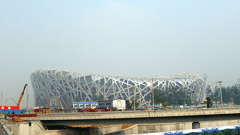
The National Arena has been popularly dubbed the "Bird's Nest." (Photo: Flickr/Wolfiewolf)
NUTTAL: Well, I mean, maybe it’s a question of the timing. Maybe they’re a scrum at rush hour whereas at the Olympics, for example, it may well be that events are going on all day and you can actually stagger in a sense the utilization of the network. I mean, that’s not unusual in many cities around the world where you get big pinpoints at rush hour.

Countdown clock to the 2008 Beijing Olympic Games (Photo: Flickr/Gene Zhang)
NUTTAL: Well, you know, China and the leadership right at the top of the Chinese government has made it abundantly clear in the last few years that they are extremely concerned about the economic costs of rising pollution in their country and they have set energy intensive targets for their industry, they’ve set renewable energy targets for their country, and I think the Olympic Games is a real opportunity for Beijing, but also for China generally, to become even more aware of the environmental challenge, of the climate challenge, of so many other similar related challenges, and also for millions of people around the world, sitting in living rooms in Boston, or in Berlin, or Bogota, or be aware of what’s happening to the planet right now and the absolute urgent need to move towards a more sufficient world, one that’s far less polluting. So, hopefully the games can act as a real catalyst for that, in China and beyond.
CURWOOD: Nick Nuttal is a spokesperson for the United Nations Environmental Programme in Nairobi. Thanks so much, Nick.
NUTTAL: Yep, thanks a lot.
Links
Living on Earth wants to hear from you!
Living on Earth
62 Calef Highway, Suite 212
Lee, NH 03861
Telephone: 617-287-4121
E-mail: comments@loe.org
Newsletter [Click here]
Donate to Living on Earth!
Living on Earth is an independent media program and relies entirely on contributions from listeners and institutions supporting public service. Please donate now to preserve an independent environmental voice.
NewsletterLiving on Earth offers a weekly delivery of the show's rundown to your mailbox. Sign up for our newsletter today!
 Sailors For The Sea: Be the change you want to sea.
Sailors For The Sea: Be the change you want to sea.
 The Grantham Foundation for the Protection of the Environment: Committed to protecting and improving the health of the global environment.
The Grantham Foundation for the Protection of the Environment: Committed to protecting and improving the health of the global environment.
 Contribute to Living on Earth and receive, as our gift to you, an archival print of one of Mark Seth Lender's extraordinary wildlife photographs. Follow the link to see Mark's current collection of photographs.
Contribute to Living on Earth and receive, as our gift to you, an archival print of one of Mark Seth Lender's extraordinary wildlife photographs. Follow the link to see Mark's current collection of photographs.
 Buy a signed copy of Mark Seth Lender's book Smeagull the Seagull & support Living on Earth
Buy a signed copy of Mark Seth Lender's book Smeagull the Seagull & support Living on Earth

